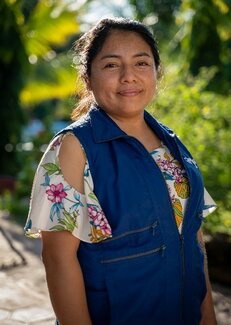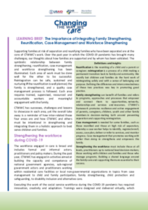
Background Information
Degree in Social Work (Trabajo Social) Marta holds a Bachelor of Social Work and a Master's Degree in Project Development. She has specialized in the care of children and adolescents in the justice system and is currently studying a diploma course on Effective Child Development Policies through the Inter-American Development Bank.
Marta es Licenciada en Trabajo Social, con una Maestría en Formulación de Proyectos Sociales. También cuenta con una especialización denominada “Enfoque Social en la Atención de la Niñez y Adolescencia desde el Sistema de Justicia” y actualmente estudia un diplomado sobre Políticas Efectivas de Desarrollo Infantil con el Banco Interamericano de Desarrollo (BID)
Our Interview With Practitioner
Through experience and knowledge, families are frequently followed up, guiding them to identify their strengths and improve the attention, protection and care practices of the children or adolescents for whom they are caring.
A través de la experiencia y los conocimientos se da un seguimiento frecuente a las familias, orientándolas para la identificación de sus fortalezas y mediante estas mejoren las prácticas de atención, protección y cuidado de los niños, niñas o adolescentes que tengan a cargo.
My advice to people interested in working in child protection and care is, “You should work in this sector as you will surely be helping to transform the reality, in many cases an unjust reality, of many people.” By strengthening the parenting skills of caregivers, children and adolescents have the opportunity to live in safer family environments, with affection, protection and attention. Also that the protection homes in charge of the processes have frequent communication and coordination to speed them up so that children or adolescents separated from their families do not remain for longer periods of time in protection homes, deprived of their right to a family due to delays in the system.
Es que a través del fortalecimiento de habilidades parenteles de los cuidadores, los niños, niñas y adolescentes tienen la oportunidad de vivir en entornos familiares más seguros, con afecto, protección y atención.
También que las instituciones de protección a cargo de los procesos tengan comunicación y coordinación frecuente para agilizarlos y no por atrasos del sistema los niños, niñas o adolescentes separados de su familia permanezcan por más tiempo en hogares de protección, privados de su derecho a la familia.
Mi consejo para las personas interesadas en trabajar en la protección y cuidado de la infancia es: "Deben trabajar en este sector, ya que seguramente estarán ayudando a transformar la realidad, en muchos casos una realidad injusta, de muchas personas".
Among the tools I would mention are all the bibliographic resources for the care of families, children and adolescents within the case management methodology. It is also important to have material resources such as a vehicle for a more personalized and experiential attention to families.
Dentro de las herramientas se pueden mencionar todos los recursos bibliográficos para la atención de familias, niños, niñas y adolescentes dentro de la metodología de manejo de casos. También importante contar con los recursos materiales como vehículo para una atención más personalizada y vivencial con las familias.
I am convinced that working with children and adolescents is important because it makes them feel recognized and they know that their needs are taken into account. I like my job because it is child focused. Due to their age, they are often invisible to others and that puts them at greater risk of their rights being violated.
Estoy convencida de que trabajar con niños y adolescentes es importante porque les hace sentir reconocidos y saben que se tienen en cuenta sus necesidades. Me gusta mi trabajo porque está centrado en los niños. Debido a su edad, a menudo son invisibles para los demás y eso los pone en mayor riesgo de que sus derechos sean violados.
First it is necessary to have clarity in the methodology to be used. I can say that the case management methodology has been very effective for a more direct approach with families and children. It has also been useful to strengthen parenting skills via parenting groups, home visits, referral of services, forming institutional support networks.
Primero es necesario tener claridad en la metodología que se va a utilizar, puedo decir que la metodología de manejo de casos ha sido muy efectiva para un acercamiento más directo con las familias y los NNA, también fortalecer las habilidades parentales con grupos de trabajo como escuela para padres, visitas domiciliarias, derivación de servicios, formar redes institucionales de apoyo.
Where They Operate
Key Areas of Work
Languages Spoken
Practitioner Resources
This learning brief was developed as part of the CTWWC 2021 annual report and shares learning from several contexts and is intended to share learning on how family strengthening, reunification, case management and workforce strengthening can be integrated in care reform.
Los Procedimientos de Manejo de Casos para la Reunificación y Reintegración de los Niños, Niñas y Adolescentes al cuidado Familiar y Comunitaria se desarrollaron a través de talleres participativos en conjunto con la Secretaría de Bienestar Social (SBS), la Procuraduría de la Niñez y la Adolescencia (PNA) de la Procuraduría General de la Nación (PGN), El Organismo Judicial (OJ), El Consejo Nacional de Adopciones (CNA), la Asociación de Hogares Cristianos de Guatemala (ASOCRIGUA) y Hogar Aldeas de Esperanza. Se basó en el trabajo de Changing the Way We Care de Kenia en la Guía para trabajadores sociales: Manejo de casos para la reintegración de niños y niñas en cuidado familiar o comunitaria, adaptada al contexto guatemalteco.


